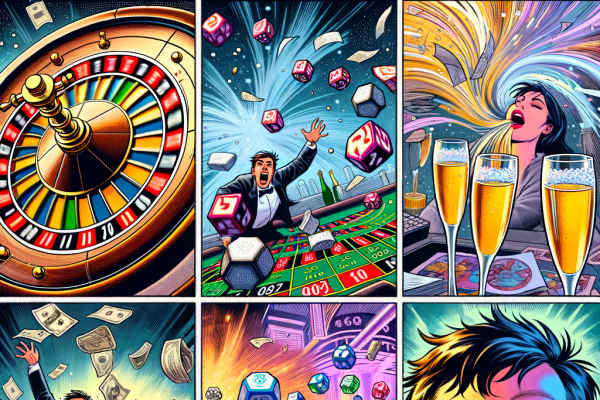Gambling has long been associated with risk, excitement, and the allure of striking it rich. The thrill of placing a wild bet can be irresistible, drawing in individuals from all walks of life. But what drives gamblers to take these extreme risks? In this article, we will explore the psychology behind wild bets, recount some of the most notorious wagers, and discuss the implications of these high-stakes gambles on the future of gambling.
The Allure of Risk: Why Gamblers Take Wild Bets
The psychology behind gambling is complex and multifaceted. One significant factor is the concept of risk. For many, the chance of winning a life-changing amount of money is too tantalizing to resist. According to research, the thrill of taking risks can boost dopamine levels in the brain, creating a euphoric feeling that encourages further gambling. This is especially prominent in high-stakes scenarios, where the potential rewards far outweigh the initial investment.
Additionally, social factors play a crucial role in wild betting. A group atmosphere, such as that found in casinos, can amplify the sense of camaraderie among bettors. This social dynamic can lead to a form of herd mentality, prompting individuals to make bolder wagers than they might otherwise consider alone. In this environment, the excitement becomes contagious, and the pressure to participate in outrageous bets can be overwhelming.
Moreover, the media often glorifies stories of wild bets, showcasing successful gamblers who achieve extraordinary wins. These narratives contribute to a mythos around gambling that entices others to pursue similar fortunes. The idea of going from rags to riches in a matter of minutes fosters a belief that anyone can be the next big winner, regardless of their gambling experience or financial situation.
Lastly, the desire for escapism cannot be overlooked. For many individuals, engaging in high-stakes gambling provides a brief respite from everyday life. The thrill of the gamble becomes a distraction from personal or financial struggles, allowing those involved to temporarily forget their troubles. This allure of risk, combined with social influences and the promise of reward, creates a potent mix that drives individuals to place wild bets.
Iconic Bets: A Look at the Most Notorious Wagers
Throughout the history of gambling, certain bets have gained notoriety for their enormous stakes and unbelievable outcomes. One of the most infamous bets took place in 2004 when a businessman wagered $1 million on a single spin of the roulette wheel at the MGM Grand in Las Vegas. The wheel landed on red, and the businessman walked away with a cool $2 million. This audacious gamble remains etched in the annals of casino history and exemplifies the extreme measures some gamblers will take.
Another iconic wager occurred in 2008 when a professional poker player, known as “The Kid,” placed a staggering $1.5 million bet on his own hand during the World Series of Poker. The pressure was immense, as a loss would mean not only the loss of his investment but also his reputation in the poker community. Fortunately, “The Kid” won the hand and turned his massive bet into a significant profit, further cementing his status as a high-stakes gambler.
A recent example involves a young man who decided to bet $50,000 on a single blackjack hand at a prominent Las Vegas casino. He won and left the casino with a whopping $200,000. Such bets illustrate the unpredictable nature of gambling and the willingness of some individuals to risk substantial sums in pursuit of glory and riches.
The table below summarizes some of the wildest casino bets ever made:
| Year | Bet Amount | Game Type | Location | Outcome |
|---|---|---|---|---|
| 2004 | $1,000,000 | Roulette | MGM Grand, Las Vegas | Won $2,000,000 |
| 2008 | $1,500,000 | Poker (World Series) | Las Vegas | Won significant profit |
| 2021 | $50,000 | Blackjack | Las Vegas | Won $200,000 |
High Stakes: The Psychology Behind Excessive Gambling
Understanding the psychology behind excessive gambling is essential for both gamblers and those who care about them. One fundamental aspect is the phenomenon known as “loss aversion.” Research shows that individuals tend to feel the pain of losses more acutely than the joy of equivalent gains. This mindset can lead to a vicious cycle where a gambler continues to wager larger amounts in an attempt to recoup losses, often spiraling into addiction.
Another contributing factor is the concept of “cognitive dissonance.” Gamblers may rationalize their wild bets by convincing themselves that they have a better chance of winning than statistics suggest. This misguided belief can lead to a series of poor decisions, ultimately resulting in significant financial loss. The gambler’s fallacy, where one believes that past outcomes influence future results, can further exacerbate these tendencies.
Peer influence also plays a notable role in excessive gambling. A gambler may feel pressured to match or exceed the bets of their friends or peers, leading to even bigger wagers. This social dynamic can create an environment where reckless behavior is normalized, further entrenching individuals in a cycle of excessive risk-taking. As such, it is crucial for gamblers to maintain self-awareness and set limits to avoid falling into this trap.
Finally, the thrill of gambling itself can trigger a powerful addiction. The brain’s reward circuitry can become conditioned to seek out the rush associated with high-stakes bets. Over time, gamblers may find themselves compelled to seek out larger and more dangerous bets to feel the same level of excitement, leading to an escalation that can quickly spiral out of control.
Unbelievable Outcomes: Stories of Wild Casino Bets
The outcomes of wild casino bets can often be as fascinating as the bets themselves. One of the most astonishing stories involves a man who placed a $100 bet on a series of football games. Against all odds, his bet turned into a $1.2 million payout. The story of how a modest wager turned into a life-altering sum exemplifies the allure of high-stakes gambling.
Another incredible tale comes from a high-stakes poker tournament where a player, facing elimination, decided to go all-in with a weak hand. The odds were against him, but through a combination of skill and luck, he managed to win the pot, ultimately leading him to victory in the tournament. This gamble not only changed his financial situation but also solidified his reputation as a fearless player.
The phenomenon of the “one-armed bandit” also deserves mention. A man in a Las Vegas casino dropped a dime into a slot machine and won a jackpot worth over $5 million. This monumental win became a legend, illustrating how the smallest bets can lead to the most extraordinary outcomes. Such stories captivate the imagination and perpetuate the belief that anyone can achieve greatness with a little luck.
Lastly, there are heart-wrenching tales of individuals who have lost everything due to wild bets. These cautionary narratives serve as reminders of the potential consequences of excessive gambling. While the excitement of big wins can be alluring, the dark side of gambling must not be overlooked. These stories highlight the importance of responsible gambling practices and the need for awareness regarding the risks involved.
Lessons Learned: The Risks and Rewards of Extreme Betting
The stories of wild bets carry essential lessons about the risks and rewards of extreme gambling. While it is easy to focus on the exhilarating wins, the potential for devastating losses is always present. Gamblers must strike a balance between the thrill of betting and the realities of risk management. Understanding the odds and setting limits is crucial to ensuring that gambling remains a form of entertainment rather than a destructive habit.
Moreover, these narratives illustrate the importance of personal accountability. It is essential for gamblers to take responsibility for their actions and recognize when their behavior may be crossing the line into addiction. Support systems, such as friends, family, or professional help, can play a significant role in guiding individuals away from destructive gambling patterns.
The concept of “responsible gambling” is gaining traction in the gaming industry, emphasizing the importance of informed decision-making. Many casinos have begun implementing policies to promote responsible gaming, offering tools and resources that help gamblers maintain control over their betting habits. This proactive approach is vital in fostering a healthier gambling environment.
Lastly, the stories of wild bets serve as a reminder that while the potential for significant rewards exists, the risks cannot be ignored. Gamblers must remain vigilant and aware of their mental and financial well-being. By adopting responsible practices, individuals can enjoy the excitement of wagering while minimizing the dangers of extreme betting.
The Future of Gambling: Are Wild Bets Here to Stay?
As technology continues to advance and the gambling landscape evolves, the question remains: are wild bets here to stay? With the rise of online gambling platforms, it is easier than ever for individuals to place high-stakes wagers from the comfort of their homes. This accessibility could lead to an increase in extreme betting, as individuals may feel emboldened by the anonymity of online gambling.
Moreover, innovative gaming experiences, such as interactive betting and live dealer games, are changing how people engage with gambling. This evolution offers new opportunities for wild bets, as players seek out unique experiences that push the boundaries of traditional gambling. As the industry adapts to consumer preferences, it is likely that extreme betting will continue to capture the imagination of gamblers.
However, the growing awareness of gambling addiction and its associated risks may lead to increased regulation and scrutiny of high-stakes betting. Governments and gaming authorities are taking steps to implement measures aimed at promoting responsible gambling, which may impact the prevalence of wild bets. Striking a balance between providing thrilling experiences and protecting consumers is crucial for the future of the industry.
Ultimately, the future of gambling rests on a delicate balance between excitement and responsibility. As long as there is a demand for high-stakes wagers, wild bets will likely persist. However, the industry must remain vigilant in its efforts to mitigate the risks associated with excessive gambling, ensuring that the thrill of the game does not come at the expense of individual well-being.
Q&A Section
Q: What drives people to place wild bets?
A: The allure of risk, social influences, the glorification of big wins, and the desire for escapism all contribute to why individuals take extreme risks in gambling.
Q: Are there any famous examples of wild bets?
A: Yes, notable examples include a businessman betting $1 million on a roulette spin and a poker player wagering $1.5 million on his own hand during a tournament.
Q: What are the psychological factors behind excessive gambling?
A: Factors include loss aversion, cognitive dissonance, peer influence, and the brain’s conditioning to seek the thrill associated with high-stakes gambling.
Q: What can be done to promote responsible gambling?
A: Awareness, setting limits, support systems, and casino policies aimed at promoting responsible practices are critical for encouraging healthy gambling behavior.
Q: Will wild bets remain common in the future?
A: While the demand for high-stakes gambling is likely to continue, increased awareness of gambling addiction may lead to greater regulation and changes in how these bets are approached.





